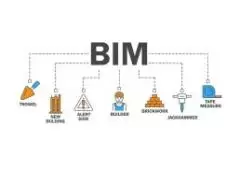Demystifying BIM: Your Guide to Building Information Management and Modeling Courses
Description
The construction industry is undergoing a digital revolution, spearheaded by Building Information Modeling (BIM). This innovative approach transforms traditional project delivery by creating a central digital model that integrates all aspects of a building's lifecycle. Building Information Management (BIM) sits at the heart of this process, ensuring the efficient creation, utilization, and exchange of building information.
Whether you're an architect, engineer, contractor, or aspiring professional in the Architecture, Engineering, and Construction (AEC) sector, mastering BIM can be a game-changer. This blog delves into the world of BIM courses, exploring their benefits, available options, and key factors to consider when choosing a program.
Why Pursue a Building Information Management and Modeling Course?
Investing in a BIM course offers a multitude of advantages:
Enhanced Employability: BIM skills are in high demand across the AEC industry. A BIM certification demonstrates your proficiency and makes you a highly sought-after candidate.
Streamlined Workflows: BIM software fosters collaboration between project stakeholders, reduces errors, and streamlines information management.
Improved Design Quality: BIM enables clash detection, optimizing design decisions and minimizing rework during construction.
Cost-Effective Projects: BIM facilitates better cost estimation and budget control, leading to more cost-effective project delivery.
Career Advancement Potential: BIM expertise opens doors to exciting career opportunities in project management, design coordination, and BIM implementation.
Types of BIM Courses
BIM courses cater to diverse learning needs and career objectives. Here are some common program formats to explore:
Diploma Courses: These comprehensive programs provide in-depth training on BIM software like Revit, Navisworks, and AutoCAD. They typically last several months and can be pursued full-time or part-time.
Certificate Courses: These intensive programs focus on specific BIM skills, such as BIM modeling for architects, structural engineers, or MEP (Mechanical, Electrical, and Plumbing) engineers. They are ideal for professionals seeking targeted skill development.
Online Courses: Online learning platforms offer flexibility for busy schedules. However, online courses often require a higher degree of self-discipline compared to classroom-based programs.
Choosing the Right BIM Course
With a plethora of BIM courses available, selecting the right program can be overwhelming. Here are crucial factors to consider:
Course Curriculum: Evaluate the curriculum's depth, software focus, and alignment with your career goals. Choose a program that covers the specific BIM applications relevant to your desired profession.
Faculty Expertise: Look for instructors with extensive industry experience and proven teaching skills. Qualified faculty can provide valuable insights and ensure a comprehensive learning experience.
Industry Recognition: Opt for programs with certifications recognized by leading industry bodies. This enhances the value of your qualification and demonstrates adherence to industry standards.
Practical Training: Prioritize courses that combine theoretical knowledge with hands-on experience. Look for programs offering projects or internships, allowing you to apply your learnings in practical scenarios.
Placement Assistance: Consider programs that offer dedicated career services or placement assistance. This can help you connect with potential employers and secure a job utilizing your newly acquired BIM skills.
Conclusion:
BIM courses equip you with the knowledge and skills necessary to thrive in the evolving AEC landscape. Carefully evaluate your learning goals, research available programs, and prioritize a course that provides comprehensive training, industry recognition, and practical experience. By investing in BIM education, you can unlock a world of career opportunities and contribute to the future of construction.
Additional Tips:
Network with BIM Professionals: Connect with professionals working in the field to gain valuable insights into industry trends and identify specific skills valued by employers.
Stay Updated on BIM Trends: The BIM landscape is constantly evolving. Keep yourself updated on the latest software advancements and industry best practices.
Explore BIM Communities: Participate in online forums and communities to connect with other BIM enthusiasts, exchange ideas, and stay informed about the latest developments.
By taking these steps, you can embark on a successful journey in the exciting world of BIM and contribute to the creation of intelligent and sustainable built environments.






You must log in or register a new account in order to contact the publisher
Useful information
- Avoid scams by acting locally or paying with PayPal
- Never pay with Western Union, Moneygram or other anonymous payment services
- Don't buy or sell outside of your country. Don't accept cashier cheques from outside your country
- This site is never involved in any transaction, and does not handle payments, shipping, guarantee transactions, provide escrow services, or offer "buyer protection" or "seller certification"







